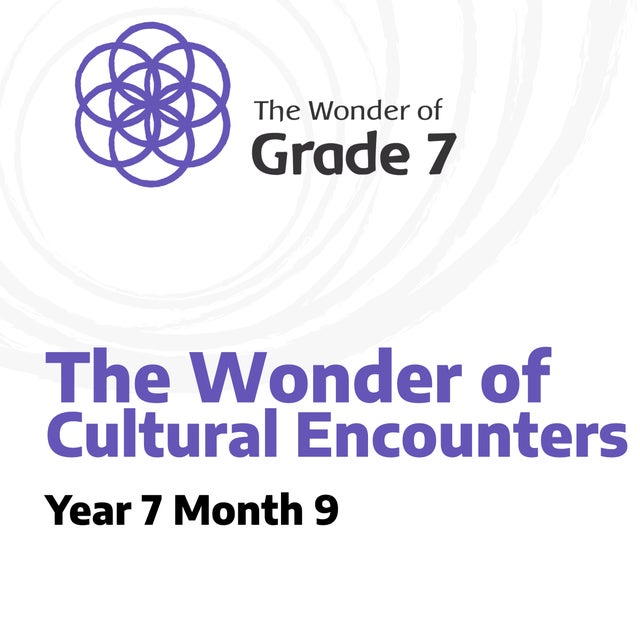- Unit Studies
- >
- Grade 7
- >
- Grade 7 Month 9 The Wonder of Cultural Encounters
Grade 7 Month 9 The Wonder of Cultural Encounters
SKU:
g7m9
CA$44.00
CA$44.00
Unavailable
per item
Exploring Europe's reasons for the Age of Exploration and Exploitation and its impact on Africa and South America.
This purchase is for 1 month of curriculum and includes access to our members-only area with supporting documents, videos, resources and community.
Curriculum Areas/Learning Outcomes
Language Arts: Concepts: Exploring stories and other texts helps us understand ourselves and make connections to others and to the world. Questioning what we hear, read, and view contributes to our ability to be educated and engaged citizens.
Connections: As your child takes on an in-depth study of an explorer of their choice, the perspective of the explorer, along with the perspective of the “discovered” people is taken into consideration. Bringing these perspectives together and balancing them within our modern consciousness brings greater awareness and understanding.
Social Studies: Concept: Economic specialization and trade networks can lead to conflict and cooperation between societies.
Connection: As your child studies the age of cultural encounters, it will highlight the challenges of establishing trade networks in already populated regions, and the conflict that ensued.
Math: Concept: Data from circle graphs can be used to illustrate proportion and to compare and interpret. Connection: Your child will work with data and probability. They will work with ratio, percent, decimal and whole numbers to create circle graphs.
Connections: As your child takes on an in-depth study of an explorer of their choice, the perspective of the explorer, along with the perspective of the “discovered” people is taken into consideration. Bringing these perspectives together and balancing them within our modern consciousness brings greater awareness and understanding.
Social Studies: Concept: Economic specialization and trade networks can lead to conflict and cooperation between societies.
Connection: As your child studies the age of cultural encounters, it will highlight the challenges of establishing trade networks in already populated regions, and the conflict that ensued.
Math: Concept: Data from circle graphs can be used to illustrate proportion and to compare and interpret. Connection: Your child will work with data and probability. They will work with ratio, percent, decimal and whole numbers to create circle graphs.
Curriculum Overview
The era known as the Age of Exploration, sometimes called the Age of Discovery, officially began in the early 15th century and lasted through the 17th century. The period is characterized as a time when Europeans began exploring the world by sea in search of new trading routes, wealth, and knowledge. The impact of the Age of Exploration would permanently alter the world and transform geography into the modern science it is today. Daily Wonder is choosing to call this era the Age of Cultural Encounters, as it was much more than an exploration, and it was only a discovery from the perspective of those exploring. This unit will seek to combine the European perspective with the historically undervalued perspective of the indigenous people living on the land where the Europeans arrived seeking adventure, wealth and fame. From this starting point, the unit will serve to promote critical and reflective thinking in your child. We are shifting and building a new cultural awareness that honours the voice of the minorities. These voices are the voices of the people that were living on these lands that the Europeans felt they discovered. The cultural encounters often brought clashes between differing worldviews. Clashes and conflicts that are still alive today. The result has left us in a period in our history where the colonizing countries have progressed in terms of wealth and land, and are considered developed, while many of the populations on the lands that were colonized are considered still developing. Your child will study a particular European explorer and learn about their life and choices, and the impact of their actions on the people of the land they “discovered”. They will create a board game that incorporates these events, lessons and consequences into a learning experience for the players.
For this unit, the learning portfolio will be used for notetaking, brainstorming of ideas, and board game design ideas. It will document the process from research to designing and developing the idea.
Each morning lesson will be used for the project. A significant aspect of this project is time management, organization, and self-regulation. There will be daily guided check-ins with your child to support their learning style, and to offer helpful tools along the way. Your child will research and investigate an explorer of their choice, and then design and develop a board game. A third part of this project is optional, depending on the work pace of your child. The third part can be a journal entry written in the last days of their life, reflecting on their life’s journey. Your child will imagine they are the explorer, and use this opportunity to imagine with hindsight, if there was anything they would have done differently if they could do it over. If there isn’t time for a written entry, you can use the questions as a guide for a discussion with your child. Other options would be to use the Flex Week for the written journal entry.
For this unit, the learning portfolio will be used for notetaking, brainstorming of ideas, and board game design ideas. It will document the process from research to designing and developing the idea.
Each morning lesson will be used for the project. A significant aspect of this project is time management, organization, and self-regulation. There will be daily guided check-ins with your child to support their learning style, and to offer helpful tools along the way. Your child will research and investigate an explorer of their choice, and then design and develop a board game. A third part of this project is optional, depending on the work pace of your child. The third part can be a journal entry written in the last days of their life, reflecting on their life’s journey. Your child will imagine they are the explorer, and use this opportunity to imagine with hindsight, if there was anything they would have done differently if they could do it over. If there isn’t time for a written entry, you can use the questions as a guide for a discussion with your child. Other options would be to use the Flex Week for the written journal entry.

